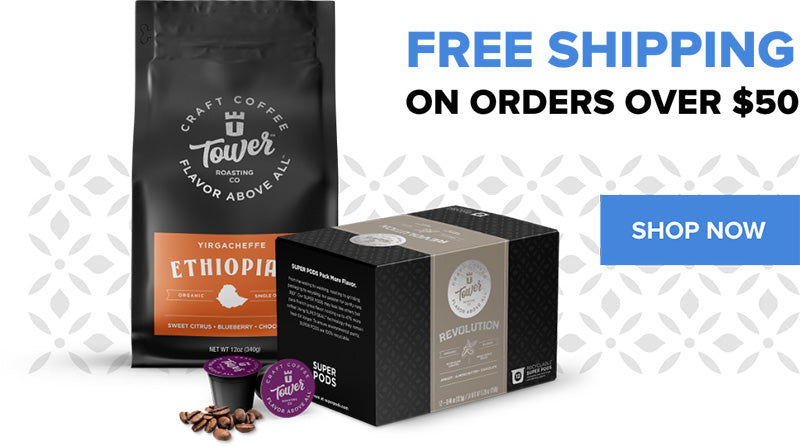Suggested Searches
Coffee Variety and Species: What’s The Difference?
Christy Ingkavet @ Jul 01, 2022
You may have heard there are many types of coffee. And while several subspecies of coffee do exist, only two main species of plants produce the world's supply of coffee.
Coffea Arabica
Also known as Arabica Coffee, this species originated in the forests of Ethiopia. It is the most widely used species in coffee drinks worldwide. According to the SCAA, about 60% of the world’s coffee production is Arabica coffee.
You may have also heard it misnamed as “Arabic Coffee.” That’s because it got its name when the bean crossed the Red Sea from Ethiopia into Yemen and lower Arabia. It is believed to be the first species of coffee that was cultivated.
Arabica coffee grows best at higher elevations and between temperatures of 59 - 79 degrees Fahrenheit.
Arabica Varieties
Varieties or cultivars of arabica coffee are produced by agricultural techniques rather than production in nature.
The most common varieties or cultivars of arabica coffee are Typica and Bourbon. These two varieties trace their origins from the initial transport of coffee from southwest Ethiopia to Yemen. They were then cultivated in the Malabar region of India.
The Dutch transported Typica seeds to Indonesia, where they were cultivated on the island of Java (hence the nickname for coffee).
The French introduced the Bourbon seeds to Bourbon Island (now known as La Reunion) in the 1700’s. Nearly 150 years later, French missionaries then brought the Bourbon beans to cultivate them in Zanzibar, Tanzania and Kenya.
Bourbon coffee was first introduced to the Americas through southern Brazil. It was cultivated near Campinas, and it spread north throughout Central America.
Coffea Robusta
Also known as coffea canephora, robusta coffee is a species that originated in central and western sub-Saharan Africa. It grows naturally from Liberia to Tanzania and south to Angola. Robusta makes up about 40% of the world’s coffee production.
Robusta was introduced to Vietnam by French colonists in the late 19th century. Vietnam is the biggest producer of robusta, followed by Brazil, Indonesia, India and Uganda.
As the name indicates, this plant is more robust. It can grow in full sun, hot temperatures, and at low altitudes — from sea level to 600 meters. It has a greater crop yield than arabica beans. It is less susceptible to infestation and disease, so it has fewer herbicides and pesticides than arabica. It is also self-sterile, so it requires cross-pollination by wind, bees, and other insects for reproduction.
There are not many famous varieties of robusta coffee because it was not as widely cultivated as arabica. Instead, robusta was introduced to many areas of the world because it could withstand diseases such as Hemileia Vastatrix — also known as coffee leaf blight or rust.
What’s Better? Arabica or Robusta
Arabica coffee is considered to taste lighter, sweeter, and have a milder flavor according to most coffee drinkers. It often has flavors reminiscent of flowers, fruit, honey, chocolate, and nuts. These flavors are enhanced in the roasting process. On a cupping table (where coffee professionals evalute coffee), Arabica often receives the highest scores for taste and overall flavor, which is why we, along with most specialty coffee roasters, choose this species.
Robusta coffee is often considered stronger and more bitter flavored. It is less acidic and has grain and nutty flavor notes. The bitterness is mostly due to higher caffeine levels and chlorogenic acid. Robusta contains 2.7% caffeine, compared with Arabica’s 1.5% caffeine levels.
While Arabica coffee is more popular, both coffees have their merits.
Robusta often works better than arabica coffee for strong espresso drinks as it has more body and crema. Crema is the light layer of dark tan foam on the surface of a shot of espresso. Robusta also has a bolder flavor that can pair well with richer, bolder flavors — like chocolate and nuts.
All of our Tower Roasting single-origin and blends are currently made from 100% organic, Arabica beans.
But as craft roasters and expert bean hunters, we would consider adding the highest-quality organic Robusta beans to our collection if they align with our mission to deliver Flavor Above All.
Try Tower Roasting Single-Origin and Blends
Our complete collection of single-origin pods and single-origin whole beans and craft-blended pods and craft-blended beans are all made from 100% organic Arabica beans grown by our farm partners in the top coffee-growing regions in the world.
Hand selected and small-batch roasted in our Bend, OR HQ, you'll always get the freshest, most delicious coffee delivered directly to you.
